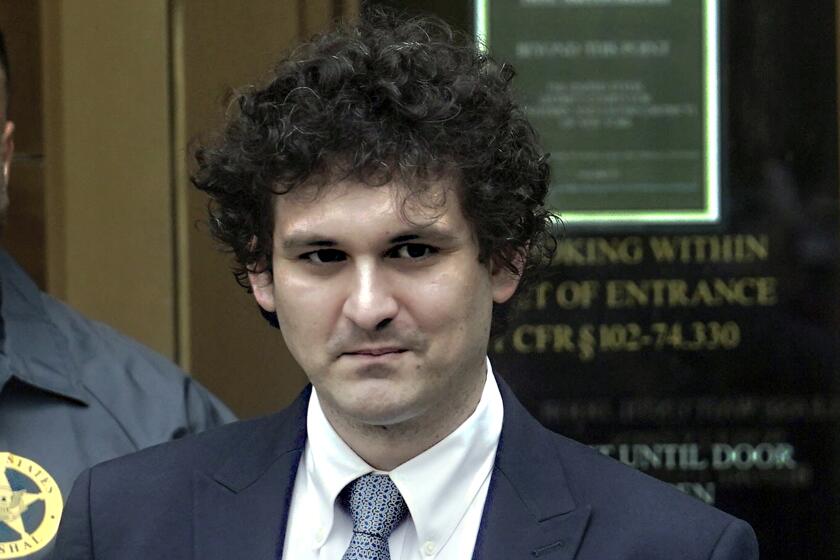Trump and his family jump into crypto, which the FBI calls a hive of ‘pervasive’ criminality

- Share via
There have been a couple of new developments in the crypto world over the last few days just begging to have their dots connected. Here they are:
On Sept. 9, the Federal Bureau of Investigation issued its annual report on cryptocurrency fraud. The FBI found that, in 2023, crypto-related fraud absolutely exploded, with $5.6 billion in losses suffered by Americans. That was a 45% increase over the year before.
“Criminal actors exploit cryptocurrencies in each scheme category” tracked by the agency’s Internet Crime Complaint Center,” Assistant FBI Director Michael D. Nordwall wrote in the report. Crime was “pervasive” in the field, he wrote, with the most common victims being investors; their losses accounted for nearly 71% of the total.
Since cryptocurrencies eliminate the need for financial intermediaries to validate and facilitate transactions, criminals can exploit these characteristics to support illicit activity such as thefts, fraud, and money laundering.
— FBI, 2023 Cryptocurrency Fraud Report
That’s one. The second development was that Donald Trump and his family jumped whole hog into the crypto market.
Via a livestream Monday on the social media platform X and numerous X postings, Trump, his sons Donald Jr., Eric and Barron identified themselves or were identified as participants in the new venture. It’s known as World Liberty Financial, and evidently plans to market a crypto “stablecoin” — one with value linked directly to the U.S. dollar — to customers. No one has suggested that there’s anything criminal in the venture as it’s been laid out. There’s no indication that Trump’s ongoing criminal cases have anything to do with cryptocurrency.
Get the latest from Michael Hiltzik
Commentary on economics and more from a Pulitzer Prize winner.
You may occasionally receive promotional content from the Los Angeles Times.
“We’re embracing the future with crypto and leaving the slow and outdated big banks behind,” Trump declared last week in a pre-livestream tweet on X.
The idea that Trump — whose prior business ventures include Trump University, which was deemed “fraudulent” by New York authorities; six bankruptcies — five of his casinos and one bankrupty of New York’s Plaza Hotel — and the failed enterprises Trump Shuttle, Trump Vodka, Trump Steaks and Trump Mortgage — would now do a cannonball dive into this sea of documented criminality seems so perfect it’s almost preordained. (Trump didn’t admit wrongdoing in the legal settlement of the Trump University case, but paid $25 million in compensation to former students and in legal penalties.)
So let’s examine just how bad crypto has been for Americans, according to the FBI. Then we’ll turn to Trump crypto.
Cryptocurrency — think bitcoin and its offspring, legitimate and otherwise — has several features that make it “an attractive vehicle for criminals,” the FBI reported.
“The decentralized nature of cryptocurrency, the speed of irreversible transactions, and the ability to transfer value around the world,” the FBI said, create “challenges to recover stolen funds. Once an individual sends a payment, the recipient owns the cryptocurrency and often quickly transfers it into an account overseas for cash out purposes.”
Crypto has had little to brag about this year, but its backers are raising campaign donations in the hundreds of millions of dollars.
It’s worth noting that some of these features are touted by crypto promoters, including the Trumps, as virtues — crypto’s decentralization, meaning that there are no intermediaries such as those “slow and outdated” banks to stand between buyers and sellers; its irreversibility, the speediness of the transactions.
Of course, to investors or consumers using cryptocurrencies as investment vehicles or means of payment, these may actually be drawbacks. If your investment manager absconds with your tokens, or a merchant fails to deliver what you bought with your bitcoin, you’re on your own.
“Since cryptocurrencies eliminate the need for financial intermediaries to validate and facilitate transactions,” the FBI said, “criminals can exploit these characteristics to support illicit activity such as thefts, fraud, and money laundering.”
According to the FBI, the U.S. is the world capital of crypto fraud. No other country comes close. Losses from complainants in the U.S. received by the FBI’s internet crime center in 2023 came to $4.8 billion; the second-ranked location of complainants was the Cayman Islands, with $195.7 million, followed by Mexico ($127 million) and Canada ($72.1 million).
The complaint roster showed that Californians lost the most in 2023, nearly $1.2 billion, followed by Texans ($412 million) and Floridians ($390 million). On a per capital basis, however, New Yorkers were the most seriously cheated, mulcted out of an average of $3,800 per 100,000 residents. Californians came in second, at $2,962.
Hiltzik: Sam Bankman-Fried’s seven guilty verdicts expose crypto as a swindle through and through
Sam Bankman-Fried gambled with a cryptocurrency scam and lost. His guilty verdicts make the rest of us winners.
As for the specific pitfalls, investment scams accounted for 71% of all cryptocurrency losses for Americans. They were followed by call center frauds, including tech or customer support or government impersonation scams.
Ransomware scams cost American businesses $27.4 million in 2023, not counting the cost of lost business, time, wages, files, equipment, or the hiring of third-party services by the victims.
This is the environment that the Trumps have embraced. When I asked the Trump campaign to comment on questions that have been raised by commentators within and outside the crypto field, including questions about the family’s partners in World Liberty Financial and about whether Trump’s launch of a new business venture raises the potential for massive conflicts of interest if he becomes president, all I got from Brian Hughes, who is identified as a “senior advisor” to the campaign, was a bog-standard attack on Democratic candidate Kamala Harris.
“Crypto innovators and others in the technology sector are under attack from Kamala Harris and the Democrats,” Hughes wrote.
“Few, even in the crypto world, seem excited about this project,” observes Molly White, an indefatigable chronicler of the costly hijinks in the world of crypto and other fringe financial assets. “Many seem concerned that it could worsen crypto’s already grifty reputation.”
Why would that be? One of the reported advisors to the Trumps on World Liberty Financial is Chase Herro, who described himself in 2018 as a “dirtbag of the internet.” Herro can be seen in a YouTube video recorded that year delivering a profanity-heavy spiel for crypto and other weird assets: “You can literally sell s— in a can, wrapped in piss, covered in human skin for a billion dollars if the story’s right, because people will buy it.”
According to a World Liberty Financial white paper viewed by Coinbase, Herro was formerly associated with Dough Finance, a blockchain app that lost more than $2 million to hackers in July.
Investment promoters are pushing people to add cryptocurrencies to their retirement plans. Here’s why that’s a lousy idea.
The white paper describes Herro as the data and strategies lead of World Liberty Financial, according to Coinbase. He and another partner, Zachary Folkman, were brought together with the Trumps by Steve Witkoff, a real estate developer close to Donald Trump.
Witkoff said during Monday’s X livestream that he had met Herro and Folkman through one of his sons. He described them as “exceptionally bright people.” He said, “They began talking to me about decentralized finance.... As I began to understand it, I said, who would understand this better than the Trump family?” The venture came together over a period of nine months.
World Liberty Financial didn’t respond to my requests for comments about Herro’s business record, the potential for conflicts of interest by Trump, the roles of his family members in the firm, or the FBI’s judgment about the criminality of crypto.
These questions all but ask themselves, however. Through this venture, Trump is setting himself up as an adversary of a banking and financial system that he would oversee as president, and as an advocate of an alternative financial system that has been the target of investigations and regulatory concerns raised by the Securities and Exchange Commission, the Department of the Treasury and other federal financial regulators.
Let’s not forget that Trump formerly condemned cryptocurrencies as a “scam” and “potentially a disaster waiting to happen.” By July, he had changed his tune. “Bitcoin is not just a marvel of technology,” he said in a keynote speech delivered at a major bitcoin conference. “It’s a miracle of cooperation and human achievement and a lot of relationships that are formed.”
Trump plainly smells money in this newfangled scheme. According to the white paper viewed by Coinbase, 70% of the crypto tokens to be marketed by World Liberty Financial — those carrying governance control over the project — will be reserved for founders and insiders such as himself. That’s an exceptionally high number, judging from other crypto ventures.
So what is World Liberty Financial but another Trump-branded get-rich-quick opportunity for himself? We all know how those others turned out. Why would this one end up any better?
More to Read
Get the latest from Michael Hiltzik
Commentary on economics and more from a Pulitzer Prize winner.
You may occasionally receive promotional content from the Los Angeles Times.













